- Home
- Michael D. Britton
Diaspora Page 3
Diaspora Read online
Page 3
they would check with their superiors and get back to him about a deal, or did they want to verify the well being of Gray’s hostages? Gray decided on the latter, and returned with his own demand.
“You may speak to my hostages, but I must also speak to one of my people who you are holding. I want to speak to Lieutenant Rupjee Sandragar.”
Sandragar was the next highest ranking officer, now that Cho was gone. Assuming Sandragar was still alive. Gray had last seen her at her post on the bridge shortly after the Magellan was swallowed up by the q’Chek ship, just before everything went black.
“Agreed,” said the q’Chek voice.
Gray opened the door to the room where the q’Chek lay, and dragged the smallest of the three – the one he assumed must be Spreck - onto the bridge, locking the door behind him. He sat Spreck up in Cho’s chair. Doing so caused a flash of anger to flare up in Gray’s chest, as he thought of his first officer’s violent death at the hands of the q’Chek. Still fighting the rage within, Gray bound Spreck to the chair tightly with some cords from one of the supply cabinets, then snapped a capsule of nasal stimulant under Spreck’s nose to revive him.
“Your people want to talk to you,” he said. “Go ahead.”
“This is Guhtyvr,” said Spreck, his true name a barely audible grunt to Gray. “I am not hurt.”
“Master, the human wants to exchange -” he was cut off by a high-pitched whine, followed by a crackling noise. “Master! The fleetship energy core is overloading! It is the prisoners – they have escaped and sabotaged the core matrix – we are going to -”
The transmission ended abruptly, and was followed by a massive shockwave that tipped the Magellan on its side so fast that the inertial compensators could not keep up. Gray was thrown to the floor and smashed against the starboard control panels. Spreck remained exactly where he was, tied down to the chair with barely enough room to breath.
Gray climbed up the seemingly horizontal wall as the gyroscopic stabilizers came back online with a low whirring sound, then he slid down the wall to the floor as the whole room seemed to slant back to normal, landing on his feet. He went to his captain’s module and punched up an external display on the viewer. Even in the nebula, Gray and Spreck could clearly see the debris. Huge chunks of the q’Chek fleetship were spiraling out in all directions, igniting some of the nebula gases as they flew past – some of the debris glancing off the Magellan’s shields.
“No,” whispered Spreck, a tear rolling down his pale cheek.
Gray stood in shock, too. However many of his crew had survived being taken by the q’Chek, they were now all dead.
“Our entire fleet – all of our warships, all of the King’s Army – were stationed in that fleetship. It was our traveling base of operations,” said Spreck quietly. “Now there is nothing left.”
“Are you saying you had everything in that mother ship? Your entire army?”
“It was how we traveled so far, so fast. Our individual ships were not capable of such great speed. The fleetship was our method of transporting the fleet to distant battle locations.”
Silence ruled the space between Gray and Spreck for a full two minutes as they continued to stare at the flaming chunks drifting past the viewer.
“So, I guess the war is over,” Gray finally said.
“No. My people will build another King’s Army. We will not stop until we have evicted our unwelcome guests.”
“You still maintain that the solar system is yours,” said Gray. “I just don’t understand how you can say that.”
“Perhaps I will explain later. Now, I must mourn. Please return me to the other room, so I may tell my officers that their brothers are dead.”
Gray untied Spreck, then took him into the airlock room. Spreck revived his men and explained the situation to them. Later that night, Gray spoke to the aliens through the intercom. “What do you eat?”
Spreck looked up. He seemed surprised that Gray cared how they were doing. “We eat various fungi, certain insects, and grains.”
“I’ll see what I can come up with.” Gray searched the ship’s storage areas and found some items that the q’Chek would find edible, and delivered them.
“Here you go,” he said, passing the food through the door, then locking it again. “It’s all I’ve got, but it should keep you alive.”
Gray returned to his command chair and piloted his ship out of the vast Nebula on a course toward home.
When Spreck was done eating, Gray decided to let him out so he could speak with him, though he kept a laser pistol trained on the alien.
“How was your meal?”
“It was sufficient. Our people used to have a much more varied diet, including ocean creatures, but our choices have been limited for the last several generations, as the small world upon which we have lived in exile is growing old and its resources are depleting. That is one reason why we seek to return to the solar system.”
“And you used to live on Earth?”
“No. The q’Chek used to live in the solar system, but not on Earth – we lived on the fifth planet.”
“Jupiter?” Gray said incredulously. “No humanoid could live there.”
“Not what you call Jupiter – that was the sixth planet. The fifth planet is no longer there. It was destroyed – the world of my ancestors is now only a belt of asteroids. The q’Chek escaped immediately before the end, and took generational ships to a far away world that was habitable, but small. We have been waiting until now to return to the solar system, because conditions have changed, making the third planet – Earth - habitable for us.”
“So, the fifth planet used to be like Earth is now?” asked Gray.
“Yes, very much so. We have been monitoring the development of the solar system for a long time, from our planet of exile, r’Lach. We sent out probes, which eventually returned data indicating that Earth had emerged from its ice age and become habitable. Our new population transport ships are faster than the generational ships my ancestors used to get to r’Lach. With our new ships, the return journey only takes seventeen Earth years. Halfway to Earth, we sent out more effective probes, which showed that Earth was populated - that humans had appeared and were flourishing. So we sent the much-faster fleetship ahead to clear the infestation and retake the solar system. I was commander of the fleet.”
Gray noted Spreck’s use of the word “infestation.” He seemed to use it casually – not with malice, but simply as a matter of fact. He continued his questioning. “How was your ancestors’ world – the fifth planet – destroyed?”
“People like you. Scientists. They tried to tap into the planet’s core to extract an endless supply of energy. But their experiments went wrong, and they destabilized the magnetic matrix. They set in motion a chain reaction that could not be stopped. They predicted the planet would disintegrate within one generation. Our people got to work building generational ships, and evacuating. It became very difficult toward the end due to the many violent upheavals ripping apart the land. Massive ocean waves battered our coasts, and the atmosphere became toxic with volcanic ash. The planet was destroyed before they could get everyone away. Nearly half of our population perished.”
“I’m sorry,” said Gray.
“It was a long, long time ago,” said Spreck.
“How long?”
“About one hundred and eighty thousand years.”
“And how far back before that does your people’s history go?”
“About three million years of what we call modern civilization.”
Gray thought for a few moments. As a scientist, it was fascinating to think that humans were a relative newcomer to the solar system population – a perspective he’d never considered before. He looked into Spreck’s face, seeking a cue – some way to gain common ground. He considered that Spreck had provided him water and treated him generally well – and that he’d been open with him.
Feeling a little m
ore comfortable with Spreck, and seeing that being a prison guard for the next few weeks would be taxing, he made a decision. “Listen. We’re alone, and we’re a long way from home – wherever you consider ‘home’ to be. And it’s going to be a long time before we get back. I’m showing forty-nine days to Earth. Now, I’ve locked out all command functions – I’m the only one who can control anything on this ship. I’ve also locked away all the weapons – except for this one, which is programmed for my hand only. Can I trust you, and your two men?”
“What are you suggesting?”
“That I release the three of you – give you freedom to move about outside of the airlock room.”
“Why would you do that?”
Gray shrugged. “Why not? It would be foolish for you to try to hurt me or escape. There is no escape. If you hurt me, this ship still flies straight to Earth and you wind up in the hands of my people – and they won’t treat you as kindly as I, I guarantee that. And besides, I think that maybe we could talk. Try to learn something from each other.”
Spreck nodded. “Agreed. You have my word that we will not attempt to harm you or escape.”
“What did you used to do before you were commander of your military?” asked Gray.
“I was raised a farmer before I joined the King’s Army. Most people on r’Lach were farmers. It was all we could do to raise enough food for our people on that miserable planet.”
“And yet r’Lach was your home –

 Turn the Page
Turn the Page Checkmate
Checkmate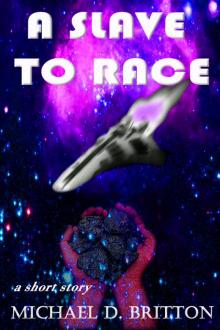 A Slave to Race
A Slave to Race The Only
The Only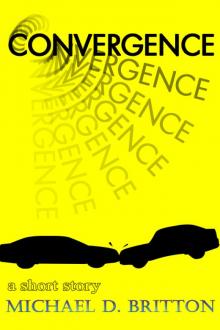 Convergence
Convergence Red Death
Red Death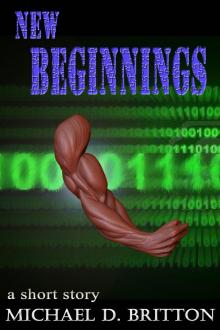 New Beginnings
New Beginnings Liberation
Liberation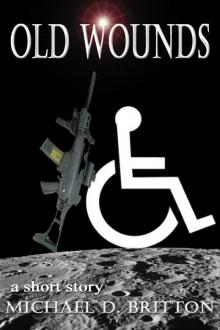 Old Wounds
Old Wounds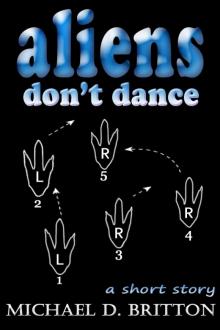 Aliens Don't Dance
Aliens Don't Dance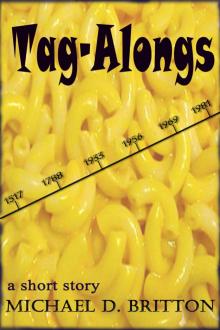 Tag-Alongs
Tag-Alongs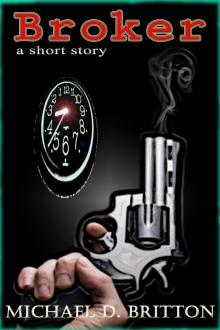 Broker
Broker Pause
Pause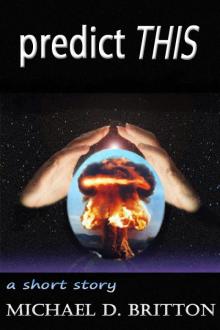 Predict THIS
Predict THIS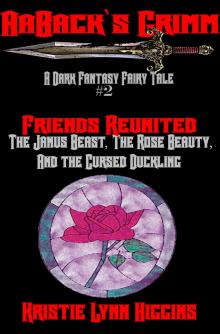 AaBack's Grimm: Dark Fantasy Fairy Tale #2 Friends Reunited: The Janus Beast, The Rose Beauty, And The Cursed Duckling
AaBack's Grimm: Dark Fantasy Fairy Tale #2 Friends Reunited: The Janus Beast, The Rose Beauty, And The Cursed Duckling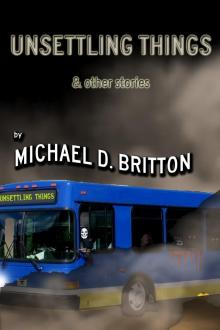 Unsettling Things & Other Stories
Unsettling Things & Other Stories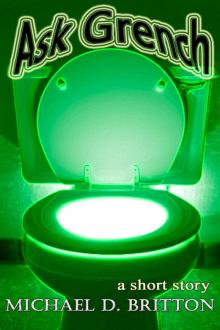 Ask Grench
Ask Grench Strings
Strings Going to the Dogs
Going to the Dogs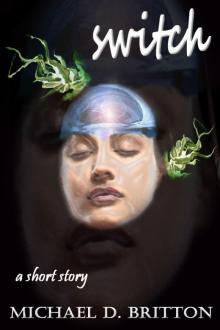 Switch
Switch Statute Forty-Nine
Statute Forty-Nine Brain Storm
Brain Storm Royal Flush
Royal Flush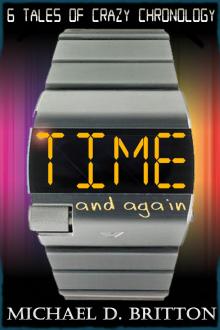 Time and Again: A Collection of Crazy Chronology
Time and Again: A Collection of Crazy Chronology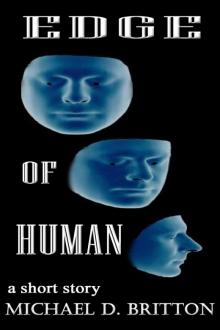 Edge of Human
Edge of Human A Sense of Souls
A Sense of Souls Decisions, Decisions
Decisions, Decisions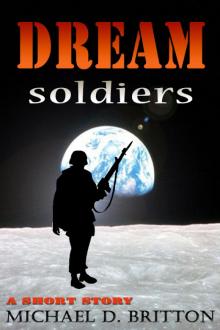 Dream Soldiers
Dream Soldiers Spies: 7 Short Stories
Spies: 7 Short Stories Prowler: Three Haunting Tales
Prowler: Three Haunting Tales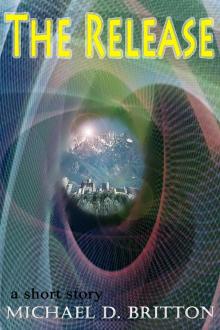 The Release
The Release Lunar Tales - an anthology
Lunar Tales - an anthology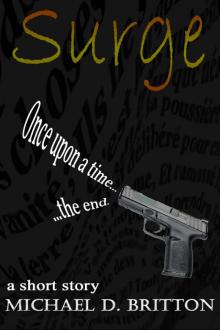 Surge
Surge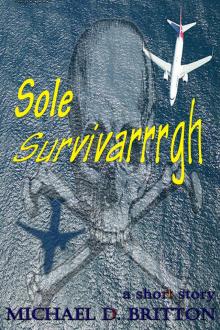 Sole Survivarrrgh
Sole Survivarrrgh Remember
Remember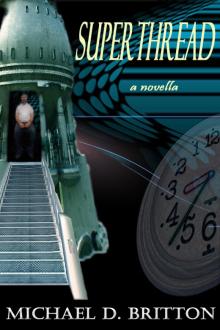 Superthread
Superthread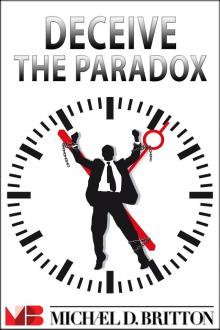 Deceive the Paradox
Deceive the Paradox Project: Dreamer
Project: Dreamer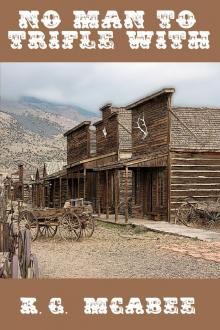 No Man to Trifle With
No Man to Trifle With Diaspora
Diaspora Quartet for Three
Quartet for Three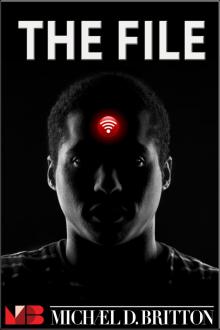 The File
The File These Dark Electrons
These Dark Electrons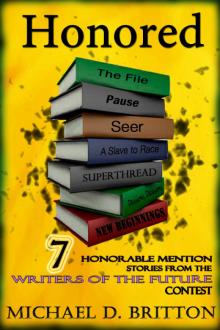 Honored: 7 Honorable Mention Stories from the Writers of the Future Contest
Honored: 7 Honorable Mention Stories from the Writers of the Future Contest Balls
Balls The Final Testament
The Final Testament The Exile
The Exile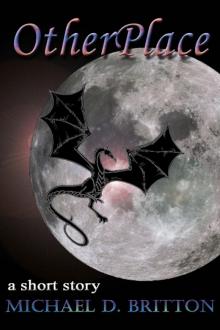 OtherPlace
OtherPlace